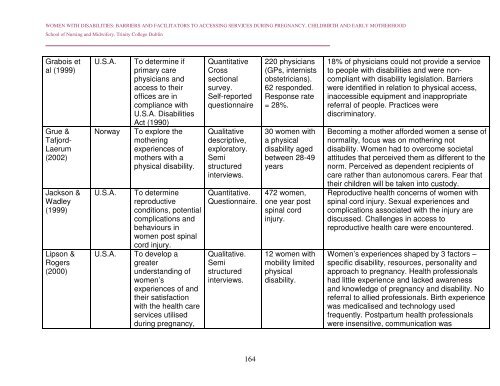Women with Disabilities: Barriers and Facilitators to Accessing ...
Women with Disabilities: Barriers and Facilitators to Accessing ...
Women with Disabilities: Barriers and Facilitators to Accessing ...
You also want an ePaper? Increase the reach of your titles
YUMPU automatically turns print PDFs into web optimized ePapers that Google loves.
WOMEN WITH DISABILITIES: BARRIERS AND FACILITATORS TO ACCESSING SERVICES DURING PREGNANCY, CHILDBIRTH AND EARLY MOTHERHOODSchool of Nursing <strong>and</strong> Midwifery, Trinity College DublinGrabois etal (1999)Grue &Tafjord-Laerum(2002)Jackson &Wadley(1999)Lipson &Rogers(2000)U.S.A.NorwayU.S.A.U.S.A.To determine ifprimary carephysicians <strong>and</strong>access <strong>to</strong> theiroffices are incompliance <strong>with</strong>U.S.A. <strong>Disabilities</strong>Act (1990)To explore themotheringexperiences ofmothers <strong>with</strong> aphysical disability.To determinereproductiveconditions, potentialcomplications <strong>and</strong>behaviours inwomen post spinalcord injury.To develop agreaterunderst<strong>and</strong>ing ofwomen’sexperiences of <strong>and</strong>their satisfaction<strong>with</strong> the health careservices utilisedduring pregnancy,QuantitativeCrosssectionalsurvey.Self-reportedquestionnaireQualitativedescriptive,explora<strong>to</strong>ry.Semistructuredinterviews.Quantitative.Questionnaire.Qualitative.Semistructuredinterviews.220 physicians(GPs, internistsobstetricians).62 responded.Response rate= 28%.30 women <strong>with</strong>a physicaldisability agedbetween 28-49years472 women,one year postspinal cordinjury.12 women <strong>with</strong>mobility limitedphysicaldisability.18% of physicians could not provide a service<strong>to</strong> people <strong>with</strong> disabilities <strong>and</strong> were noncompliant<strong>with</strong> disability legislation. <strong>Barriers</strong>were identified in relation <strong>to</strong> physical access,inaccessible equipment <strong>and</strong> inappropriatereferral of people. Practices werediscrimina<strong>to</strong>ry.Becoming a mother afforded women a sense ofnormality, focus was on mothering notdisability. <strong>Women</strong> had <strong>to</strong> overcome societalattitudes that perceived them as different <strong>to</strong> thenorm. Perceived as dependent recipients ofcare rather than au<strong>to</strong>nomous carers. Fear thattheir children will be taken in<strong>to</strong> cus<strong>to</strong>dy.Reproductive health concerns of women <strong>with</strong>spinal cord injury. Sexual experiences <strong>and</strong>complications associated <strong>with</strong> the injury arediscussed. Challenges in access <strong>to</strong>reproductive health care were encountered.<strong>Women</strong>’s experiences shaped by 3 fac<strong>to</strong>rs –specific disability, resources, personality <strong>and</strong>approach <strong>to</strong> pregnancy. Health professionalshad little experience <strong>and</strong> lacked awareness<strong>and</strong> knowledge of pregnancy <strong>and</strong> disability. Noreferral <strong>to</strong> allied professionals. Birth experiencewas medicalised <strong>and</strong> technology usedfrequently. Postpartum health professionalswere insensitive, communication was164
















